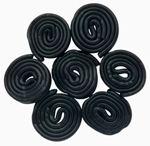 Licorice is a shrub that has been used medicinally for centuries. It has also been heavily researched and studied. The key therapeutic element of licorice is glycyrrhizin, which is found in the rhizome (part of the root structure). Licorice also contains flavonoids and phytoestrogens, which may be significant. In addition to its medicinal properties, licorice is often added to medications for its taste. Licorice root is truly an all-purpose herb, and it is one of the common herbal remedies in your local health shop. It has been around for ages in the Far East. (Just so we’re clear, this isn’t the candy I’m talking about.)
Licorice is a shrub that has been used medicinally for centuries. It has also been heavily researched and studied. The key therapeutic element of licorice is glycyrrhizin, which is found in the rhizome (part of the root structure). Licorice also contains flavonoids and phytoestrogens, which may be significant. In addition to its medicinal properties, licorice is often added to medications for its taste. Licorice root is truly an all-purpose herb, and it is one of the common herbal remedies in your local health shop. It has been around for ages in the Far East. (Just so we’re clear, this isn’t the candy I’m talking about.)
Licorice fights inflammation. It attacks viral, bacterial and parasitic infections. It is a good cleanser of the colon. It’s good for the breathing system, as it can reduce muscle spasms and increase the movement of mucus in the lungs and bronchial tubes. Licorice supports adrenal-gland function (your adrenals are responsible for regulating many hormones, as well as the electrolyte balance in your body). Licorice even helps stop plaque from growing on the enamel of your teeth.
That’s not all, though. Licorice can help with some pretty serious conditions, too, like hepatitis C. Apparently, licorice may prevent the development of liver cancer and cirrhosis in people who already have hepatitis C. Licorice has also been used to treat allergies, depression, chronic fatigue, emphysema, and hypoglycemia.
Whew — that’s quite a list! But today we want to focus on how licorice could help treat hepatitis C…and potentially even prevent liver cancer.
In Japan, the hepatitis-C virus is the most frequent cause of liver cancer. It results in over 30,000 deaths each year. Medical scientists do not yet understand how hepatitis C leads to liver cancer, but they think that it has something to do with infections and inflammatory changes caused by the virus.
Because of this link, for more than 40 years, a preparation of licorice called “Stronger Neo-Minophagen C” (SNMC) has been used for the treatment of hepatitis in Japan. A clinical trial was performed to try to evaluate the effectiveness of licorice in preventing the development of liver cancer. Patients with chronic hepatitis received 40 ml per day of SNMC for four weeks, while a control group received placebo.
The researchers discovered that liver cirrhosis occurred less frequently in 178 patients on long-term SNMC than in 100 controls: 28% versus 40%. Also, liver cancer developed less frequently in the 84 patients on long-term SNMC than in the 109 controls: 13% versus 29%.
According to the researchers, these results indicate that long-term treatment with SNMC could prevent the development of liver cancer in patients with chronic hepatitis. In particular, the researchers reported that SNMC is helpful in patients with chronic hepatitis C who don’t respond to — or can’t be treated with the medication interferon.
A word of caution about licorice extract: if it is taken for more than a week, it could cause high blood pressure. If you suffer from diabetes, glaucoma or high blood pressure or you have a history of stroke, you may not be able to use licorice as a remedy. If you’re interested in using SNMC for hepatitis C or to prevent liver cancer, talk to your doctor or a good naturopath to find out how to get it and to see if it’s safe and appropriate for you to take. There are contraindications, potential side effects, and drug interactions, so use caution and follow direction. If you are taking licorice as medicine, avoid eating licorice candies and other food products at the same time.
